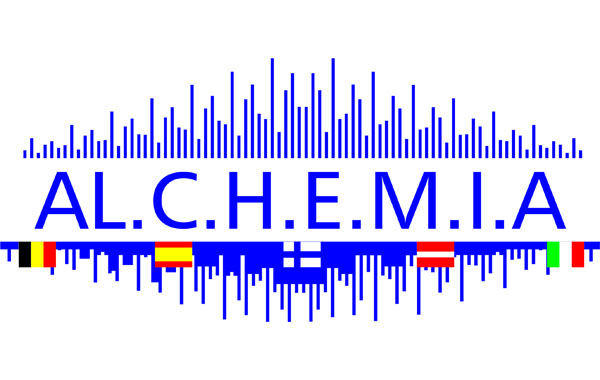 <p> AL.C.H.E.M.I.A. (Alliance of Cultural Heritage Exchange for Musical Innovation and Acquisition) is an Erasmus+ project organized by music schools from Finland, Italy, Latvia, Belgium and Spain.
<p> AL.C.H.E.M.I.A. (Alliance of Cultural Heritage Exchange for Musical Innovation and Acquisition) is an Erasmus+ project organized by music schools from Finland, Italy, Latvia, Belgium and Spain.
The project AL.C.H.E.M.I.A. is dedicated to innovation in the field of musical education.
When a young student begins to study an instrument, aside from the inherent difficulties in learning the instrument’s technique, he or she is faced with numerous challenges tied to their own proficiency in the language of musical theory: reading music, knowledge of rhythm and harmony, understanding of the signs and expression symbols, stylistic awareness.
Traditional educational methods detach theory from musical practice, leaving the first as a quasi-mathematical approach with nearly no artistic value. At the same time, the instrumental lessons had a frontal approach, leaving ensemble practice at a much higher level, implying years upon years of study.
In recent years in diverse scholastic institutions within the European Union, there have been developments in teaching methods tied to their respective cultural heritages.
The main goal of the project is to unite these methods and to create a new teaching system that grants young students, wishing to learn an instrument or understand theory better, a comprehensive and effective approach: stimulating the musical-technique growth through ensemble and orchestra; learning musical theory and connecting musical symbols, rhythm, harmony and expression with sounds, with the human voice; stimulating and empowering the musically creative side by strengthening individual practice and learning improvisation and composition. In general, this will permit to develop and strengthen the skills and competences in creativity of the students.
To ensure that this project is effective and long-lasting, it is necessary to target these lessons toward students aged between 11 and 16 years old, at which point students are faced with a multitude of new educational methods and proposals and when they are most prone to adapting to new ideas and learning methods.
There will be a selected group of 8 students from each participating institution: four strings (instruments: violin, viola, cello, bass), four winds (instruments: flute, clarinet, trumpet, horn), a pianist and a percussionist. There will be three instructors from each institution that will follow the project: professors of ensemble music and orchestra, music theory, choir.
The project AL.C.H.E.M.I.A. is specifically based on, and dedicated to, diverse cultural and musical heritage which can only be learned and appreciated through transnational activities and events held in participating host nations.
The stimuli to developing creativity are part of a process that is strongly supported by the Finnish national culture and politics.
The Ylä-Savon Musiikkiopisto has been developing new approaches to creativity and codifying a new methodology with this approach in mind.
The Scuola di Musica di Fiesole has developed its own teaching methodology – essentially dedicated to strings and piano – that allows young students to learn an instrument through playing together in ensemble.
Singing together is a fundamental element in Latvia’s national identity. Some of the events that led to its independence in 1989 have since been labeled the “singing revolution”. The Lielvarde District Music and Art School brings with it this incredible tradition, in which whoever wishes to start studying music must learn music theory by singing in an ensemble.
The great Franco-Flemish musical tradition is at the heart of the Belgian national heritage and identity. The Academie voor Muziek, Woord en Dans – Bornem (Belgium) would like to develop an educational course of study that expands on a completely innovative educational methodology, inspired by the music of the 15th and 16th centuries, and elaborating on young students’ skills in vocal and instrumental improvisation, creating a veritably novel and innovative educational method based on their own musical traditions.
The Conservatorio Professional de Musica de Osuna is a testament to the great Andalusian Band traditions with winds, as well as other instruments like the guitar, that push each instrumental member of these ensembles to perform at the highest levels and maintain a stimulating and challenging environment with the technical challenges faced in musical preparation and performance preparation.
With a project of this scope, it is of the utmost importance to introduce and expose students and teachers to the varied national cultures and histories, giving respect to past events that led to the distinct national identities and cultural particularities of each participating nation, allowing students and teachers to have a broader and more complete musical background to draw from later on in each of their future musical careers. The main goal of this project is to create a new educational methodology that unites the varied specializations that each Institution provides, creating a comprehensive course of study that is stimulating, innovative and effective. </p>



